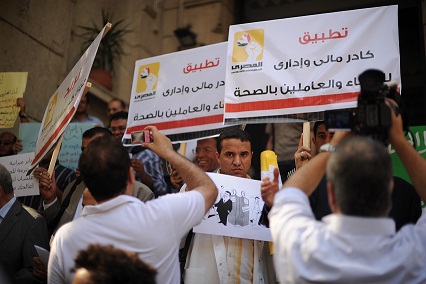English readers who have been anticipating the translation of “Chicago, are quickly depleting bookshops’ stocks. And the question on everyone’s minds is: Will it be as good as “The Yacoubian Building ?
That’s a lot of pressure for any author to face, but Alaa El-Aswany does not disappoint his English-speaking fans.
He was inspired when he decided to set his second novel in the United States’ windy city of Chicago. Fans of his blockbuster debut novel “The Yacoubian Building waited impatiently for his next publication. With anticipation comes expectation, so what better way to avoid comparisons than to transport his main characters somewhere as far removed from the heart of Cairo’s downtown, with whom we became so intimate in his previous novel?
While it may be a new territory for some of his readers, it is familiar ground for the author. He chose to set his latest novel in the histology department at the University of Chicago where he earned his PhD years ago.
El-Aswany told reporters that the choice of an American setting was risky for an Arab author because it is so unusual in Arab literature. But I asked myself Why not? I know many Americans very closely, and this is one of the missions of literature – to present people as human beings, not to label people according to their backgrounds, he said during an earlier interview with Reuters.
Once again, El-Aswany skillfully demonstrates his talent of transposing an etching of his surroundings onto paper. He maintains his signature style of unfolding a series of vignettes that intertwine as the story progresses. The Egyptian characters range from the despicable Ahmed Denana, who spies on his fellow students for Egyptian intelligence, to idealistic leftist Nagi Abdel Samad, who tries to rustle up signatures for an opposition statement timed for a visit to Chicago by the Egyptian president. One of the main characters, American histologist John Graham, is an aging activist who confronts the racism in US society, shelters a black American woman and sympathizes with Nagi s campaign against an authoritarian Egyptian government. And in keeping with his nature, the author does not shy away from controversial topics.As ever, El-Aswany shows a keen insight into people, but somehow the characters in “Chicago lack the depth that we have come to expect. The characters are all fallible and fragile. It’s hard to believe that of all the Egyptian students who have not had much exposure to Western societies, only one explores beyond their own transplanted community. But is this a true assessment, or have we come to expect too much from El-Aswany? It’s hard to say.The English translation flows well in the narratives. What might have aided in the characters’ temporary lapses in credibility is the stunted dialogue. It’s unclear whether it’s a poor translation from the Arabic, or whether it’s a translation of El-Aswany’s poor interpretation of spoken English. Either way, the characters are reciting lines rather than speaking and it inhibits the fluidity of the story.El-Aswany defended his work from local critics who have taken offense at the prominence and explicitness he gives to sex throughout the novel, which includes oral sex, masturbation and detailed information on the use of vibrators. It’s questionable whether these topics were essential to probe into in detail. Possibly it was the author’s attempt to test the boundaries of acceptance; possibly it was an attempt to sell more copies of the novel.The more interesting aspect of the novel is how the Egyptian and American characters interact. At times we feel that they are so different, and at other times they are so alike. El-Aswany demonstrates how we are all products of our society and circumstances.
ChicagoBy Alaa El AswanyTranslated by Farouk Abdel WahabThe American University in Cairo Press, Jan 2008




